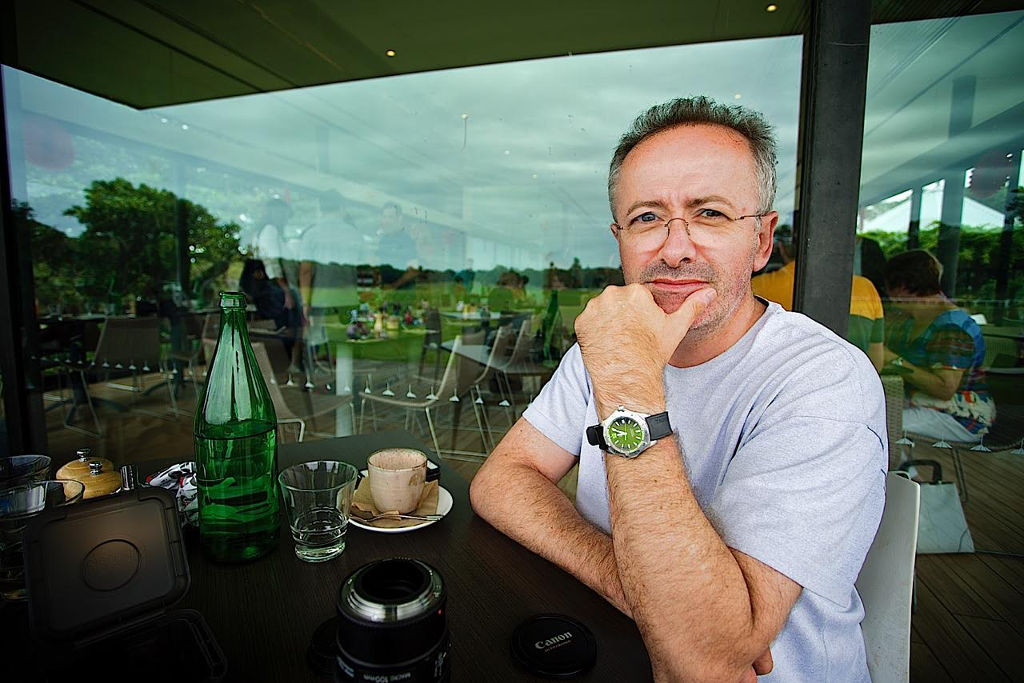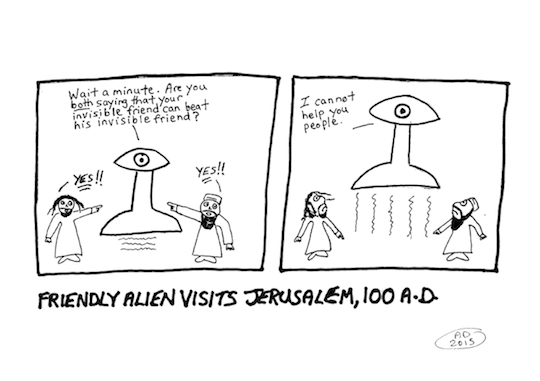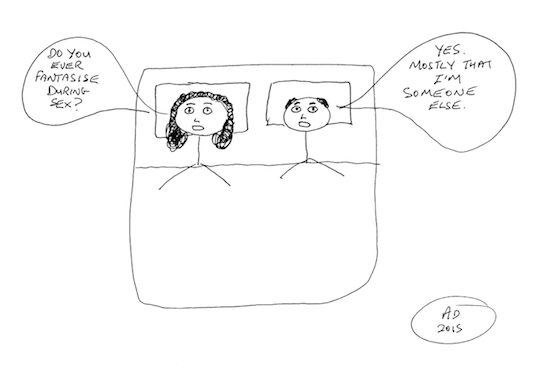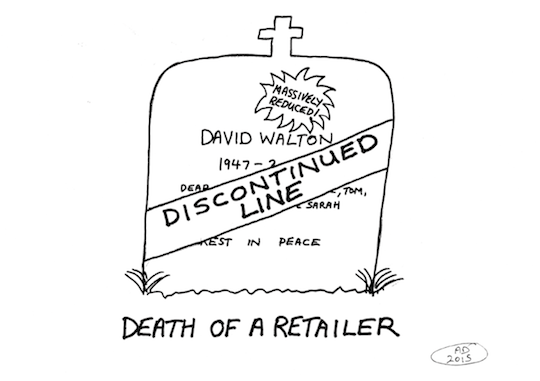Andrew Denton Never Retired, He’s Just A Sassy And Intimidatingly Funny Cartoonist Now
We interviewed him about his new book, which wasn't terrifying at all.

Brought to you by Media Super
We teamed up with Media Super, the industry super fund for creative people, to ask some Australian legends about life, creativity, and work after retirement.
–
Do you know how hard it is interviewing Andrew Denton? It’s like giving Leonard Cohen your year nine poetry, or asking Anna Wintour what she thinks of your shoes. How do you question the best questioner who ever questioned?
Anyone with a sense of humour and a television in late ‘80s and ‘90s Australia knew well and loved every one of his shows. From CNNNN to Denton, Enough Rope right up to The Gruen shows and Randling, Andrew Denton — and his intrepid, empathetic and relentless way with people — was the guy we all snuck out of bed to watch from behind the lounge.
In 2013 he announced his retirement from television, but unsurprisingly this hasn’t slowed him at all. With his new book of cartoons for literary journal Going Down Swinging, Looking a Little Drawn, being championed by the likes of Matt Lucas, and a podcast in the waiting, we talk to him about censorship, media, and his tireless retirement. We also take an exclusive look at some of his cartoons.
–
JUNKEE: Congratulations on your cartooning for Going Down Swinging, they’re very excellent. Was the TV career just subterfuge? Were you always a cartoonist deep down?
ANDREW DENTON: Why thank you. It’s certainly a lot more fun drawing cartoons than slapping on make-up and doing monkey tricks for the camera. I have always had a deep love for cartooning. Back in the day when my job description was ‘comedian’ (yes, I know, hard to believe), unlike a lot of other comedians, my greatest influence wasn’t fellow comics but cartoonists.

I grew up cutting out cartoons from newspapers and magazines — Punch, Private Eye, National Lampoon, The New Yorker — and sticking them on my wall. In fact I still have many of them; an example, from The New Yorker, guy behind desk on phone looking at his diary: “Thursday’s no good …how about never?”. Beautiful. You can’t beat that.
–
J: Is this a one-off, or a new career?
AD: Ah. Well. Just quietly, I would love it if somebody wanted to give me a space to publish more cartoons. Having said that, I wouldn’t want to take even an inch of opportunity from real cartoonists. Let’s face it, I draw like a five-year-old. A five-year-old, in fact, whose parents look at his drawings then go into the next room and whisper: “do you think we should get him checked?”. On the other hand, as Cyanide And Happiness, and also David Shrigley, show, drawing ability isn’t necessarily the main thing. Which is a blessed relief.
–
J: I know the editorial team at GDS decided not to print one cartoon that was about the prophet Muhammed (though not featuring an image at all, which was the gist of the joke); how do you feel about more and more publications (now including the infamous Charlie Hebdo) becoming increasingly conservative and nervy about the issue and abandoning their previous position of defending “the right to caricature”?
AD: That was a mutual, though reluctant, decision. I had shown my ‘Muhammed’ cartoon to a few friends, whose judgement I trusted. Even though the point of the cartoon was ‘what would Muhammed himself find acceptable?’ (it was of him looking in the bathroom mirror but blocking out his face with his hand), they said: “it really only takes one person who wants to seize on this to stir up anger against you. Are you making a big enough point to want to potentially take that on?” I thought about it and the answer was no. Which, in truth, I find depressing. It’s a fundamental basis of an enlightened society that we’re allowed to openly comment on, and question, our own and other people’s beliefs and values. This doesn’t just apply to religion, it applies to science and politics and morality and culture.

One of the great engines of human thought has been doubt. The simple question “can this be right?” is very powerful. My view is that any religious or political belief which states “there is only one way, and one answer and, what’s more, if you disagree with that you must die” should be held up to question. Sometimes, that question comes in the form of satire, ridicule or caricature. It is still a valid question. The fact that those who observe Islam do not allow images of the Prophet is a matter for them. It is about their observance, not mine.
The reality is, human beings will always dispute about God and The Meaning Of Life. We have unfortunately been given brains just big enough to terrify us about Existence, but not quite big enough to help us control that terror. Which is why moments like the Charlie Hebdo slaughter occur. But if we don’t find a way to have these conversations, and to play out our endless disagreements about the Unknowable, then we will tear ourselves apart. That’s why I drew the cartoon about the Fundamentalist Moderates who “travel the world slaughtering anyone who won’t see both sides of the argument”.
I did suggest to the editor of GDS that if we weren’t going to publish the Muhammed cartoon, perhaps we should just title my collection 30 Cartoons About The Prophet Muhammed. I think he thought I was joking.
–
J: Shows like Denton, Enough Rope and CNNNN had a sort of lithe fearlessness that seems to have evaporated completely from Australian media and comedy today (though traces are left behind in other projects you had a hand in like the Chaser vehicles) — do you think the media’s return to conservatism is reflective of the current generation?
AD: I’m always wary about making generational judgments. I think that each generation throws up its own set of stirrers, iconoclasts and piss-takers, but sometimes it takes a while for those people to find full voice and for the audience to find them in turn. What has changed since the days of CNNNN, for example, is the number of outlets competing for the audience’s attention, each one carving out its own niche.

Junkee is just one example. With the conversation being carved up into so many little chunks, two things happen: one, it’s harder for a dominant voice to emerge. Two, the platforms that still reach large audiences — and this is traditional media we are talking about — are less sure about taking risks (particularly with comedy and satire) because they are desperately trying to cling on to the audience they’ve got, which means they are trying not to scare anyone off. That’s why commercial television is largely made up of cooking and renovating shows and it’s why the ABC, in particular, remains so important because it’s the only broadcaster that still regularly encourages newer, riskier voices to hone their craft and be heard.
Having said that, Waleed Aly on The Project is an interesting new voice that brings some thoughtful provocation to the table and the emergence of the team behind The Weekly on the ABC has been a real positive.
–
J: Your retirement from television in 2013 was a pretty big deal for your fans, being such a cornerstone for the ABC — was it a difficult decision to make?
AD: Very very easy. I had been doing television, on and off, for 27 years, I was 52, and a VERY LOUD VOICE in my head was shouting “for God’s sake, go and do something different!”. And I’m so glad I did. One of the big things I wanted to do was get to some of the wild places on the planet while I was still in good enough nick to do so. In the last three years I have been to Antarctica, the Arctic and the Kimberley; trekked in the Northern Territory and Tasmania and along the Great Ocean Road; been skydiving and whitewater rafting in New Zealand, snorkelling in the Galapagos and off Easter Island; and scuba diving in New Guinea. I just know that on my deathbed, the elemental power of these places will be with me in a way that most of the things I’ve achieved in the workplace will not.

–
J: You don’t seem the type to retire. Are you ever tempted to chuck a Farnsie and suspend retirement for a new project?
AD: Well, my attitude is that life is the career, not the other way around — so see the answer above. In that sense, I’ve been really busy. I’ve also been keeping my brain busy and have spent most of this year quietly working on a podcast series about euthanasia, for which I’ve travelled around Australia, and to Belgium, The Netherlands and Oregon (three places where euthanasia, or assisted dying, is legal) and spoken to upwards of 100 different people on all sides of the argument. It’s been intense and very challenging and the edit lies ahead (cue panic). Expect to see it somewhere online in November.
As for doing television again? It would be a dumb thing to say ‘never’, but it would have to be something that I really thought was worth doing and that wasn’t just repeating myself.
–
J: Does being a professional interviewer make you particularly interrogative in your day-to-day life? Is it hard to shake?
AD: The other way around. I have always found it fascinating to try and unpick other people to see how they work. Human beings — the “virus in shoes,” as Bill Hicks described us — are just so endlessly weird and surprising I can’t stop asking questions of them. Naturally, that includes myself.

–
J: Are you able to name a successor? Are there any bright minds we should be paying attention to?
AD: There are great interviews being conducted around Australia all the time. I’ve already mentioned Charlie. I think he’s making a serious effort to have a decent conversation. Waleed, too, can ask good questions though in a commercially truncated format. Karl Stefanovic, on Nine, does some fantastic interviews — straight to the guts of it, no bullshit.
Sarah Ferguson on the ABC is, for mine, a once-in-a-generation political interviewer, a one-woman argument for the role of the ABC. Richard Fidler is without peer as a long-form interviewer on radio and I also have a very high regard for Jon Faine and, on occasion, Neil Mitchell on Melbourne radio. Jane Hutcheon and Virginia Trioli, both ABC, bring real skills to the game too.
Someone who I think should be given the opportunity to do more interviews, because I think he has a natural listening skill to go with his wit, is Tom Ballard. He did a great job guest hosting Q&A and I’m genuinely surprised there don’t appear to be networks knocking on his door.
–
J: What are your tips for retirement? Is it all DIY renovations and caravan trips around Australia?
AD: See answer about ‘Life Is The Career’. I am so not retired. I’m just not doing the things that other people define as ‘career’. I like this take on the whole thing from the Roman philosopher Seneca:
“It is not that we have a short time to live, but that we waste a lot of it. Life is long enough, and a sufficiently generous amount has been given to us for the highest achievements if it were all well invested. So it is: we are not given a short life but we make it short, and we are not ill-supplied but wasteful of it… Life is long if you know how to use it.”
–
Get your copy of the (very) limited edition of Looking A Little Drawn here.
–
Your super is your money – be a tightarse and don’t leave multiple accounts lying around! Take control and you too can pursue your creative dreams in retirement.